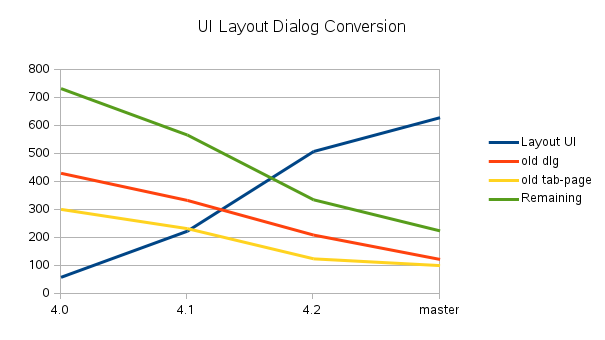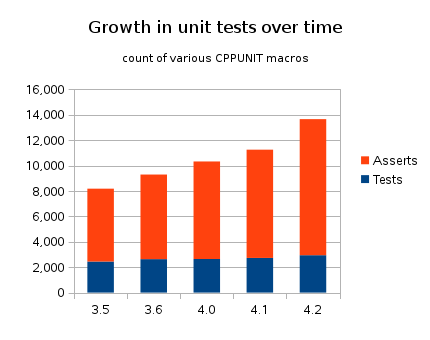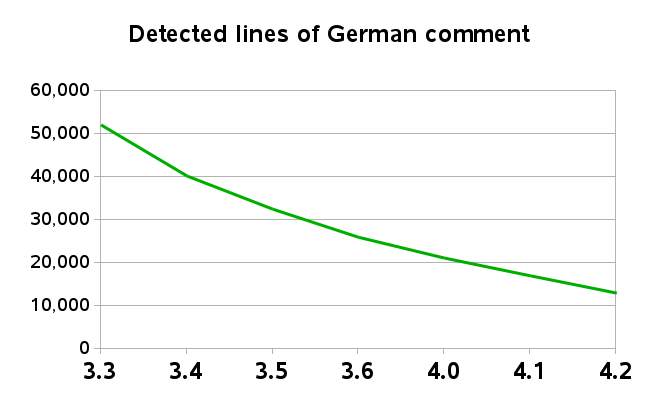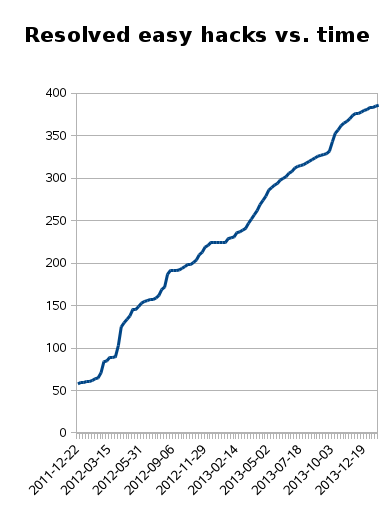Today we release LibreOffice 4.2.0, packed with a load of new features for people to enjoy - you can read and enjoy all the great news about the user visible features from so many heroic contributors, but there are of course also some contributors whose work is primarily behind the scenes, in places that are not so easy to see - but is still vitally important to the project. It can be hard to extract those from the over twelve thousand commits since LibreOffice 4.1 was branched, so let me expand:
User Interface Dialog / Layout
The UI migration to Glade layout based XML files continues apace with contributions from many individuals, we managed to convert another 280 dialogs in this release, getting us around 70% of the way there. Many thanks to: Caolán McNamara (Red Hat), Manal Alhassoun (KACST), Olivier Hallot (EDX), Faisal M. Al-Otaibi (KACST), Laurent Balland-Poirier, Efe Gürkan Yalaman, Krisztian Pinter, Jan Holesovsky (Collabora), Andras Timar (Collabora), Cao Cuong Ngo, Gergo Mocsi, Katarina Behrens, Abdulmajeed Ahmed (KACST), and Alia Almusaireae (KACST). Thanks also to our translators who helped in the migration of strings.

If you'd like to get involved in driving this to 100%, checkout Caolan's howto and updates.
Build improvements
We've improved a lot this cycle in terms of buildability, and ease of comprehension - important for new contributors.
Much improved compile/run cycle
Six months ago we reported the great news of a pure
gnumake build which is faster and sweeter. To compound the
goodness for 4.2 we worked hard to ensure that you can compile and
then just run LibreOffice without a slow install phase directly after
compiling. We build a live, run-able image into
instdir/, so:
./autogen.sh make cd instdir/program ./soffice -writerIs enough to get a fully working suite on Windows, Mac or Linux. That avoids a ton of perl, cleans up a lot of
scp2/
and includes removing a chunk of install-time setup. Thanks to
Michael Stahl (Red Hat), David Tardon (Red Hat), Matus Kukan(Collabora)
and Marcos Paulo de Souza. It's always fun to see partners
exchanging runnable Windows installs as an instdir.zip.
As an added bonus we also removed some vile platform specific
sub-directories from the build infrastructure things like
unxlngi6.pro all over the place; if people want to
build multiple platforms from the same source they can run
configure from a separate directory. Thanks to Michael Stahl
(Red Hat), and Tor Lillqvist (Collabora).
Individual localisation builds
Building the large number of localisations that go with LibreOffice -
we support 100+ languages out of the box creates quite a compile-time load.
Thanks to Bjoern Michaelsen (Canonical) - we can now
compile localisation
separately from the main package. This helps Linux packagers in
multiple ways. The split lowers the requirements for disk space on the
build machine (which can be over 25 GB for a release build), which is
helpful for porting to more constrained architectures. Builds and respins are
faster. With the in-place runnable LibreOffice build into instdir
we can also avoid using crufty scp2/ macros interpreted by perl to package
these directly. The change also makes it easier to re-spin security fixes
without re-building hundreds of unchanged localizations, we look forward
to Linux distributions picking this up to ease their packaging and
maintenance burden.
Autodoc is dead, long live Doxygen
For many years, horrible hacked version of ... now thanks to
Michael Stahl (Red Hat)'s great work
doxygen has been taught about LibreOffice's UNO IDL and we've rid
ourselves of the cosv, udm and autodoc top level modules -
good riddance to 57k lines of code. Thanks also to those who helped to
improve, cleanup and 'doxygenize' code comments in 4.2
Julien Nabet, Miklos Vajna (Collabora), Christian Lohmaier (TDF),
Thorsten Behrens (SUSE), Stephan Bergmann (Red Hat),
Zolnai Tamas (Collabora). You can read our generated documentation for: public API and
internal API here.
Code quality work
There has been a lot of work on code quality and improving the
maintainability and cleanliness of the code. Another 80 or so commits
to fix cppcheck errors thanks to Julien Nabet, the daily
rumble of building without any compile warnings with
-Werror -Wall -Wextra on each platform with thanks
primarily to Tor Lillqvist (Collabora) and Caolán McNamara (Red Hat).
Coverity scan
We have been chewing through the huge amount of analysis from the Coverity Scan, checkout the recent Spotlight Report on LibreOffice. We've seen 210 fixes (and many more closed tickets) in this release alone with many thanks to Caolán McNamara (Red Hat), Eike Rathke (Red Hat), Julien Nabet, Norbert Thiebaud, Andrzej Hunt (Collabora), Markus Mohrhard (Collabora) and Gergo Mocsi
Import and now export testing
Thanks to Markus Mohrhard we have the successful import crasher tests, that now test 45,000+ problem / bug documents from bugzillas across every project we can get our hands on. We load them one by one in a build with paranoid debugging assertions turned on. In recent times, we've also started exporting these documents to multiple different file formats looking for export issues, then, subsequently running whatever validation tools we can on the output. That, over time has a great impact on quality. Output is logged by git hash.
Valgrind fixes
Valgrind continued to be a wonderful tool for finding and isolating leaks, and poor behavior of various bits of code. Thanks to Mark Wielaard for fixing a number of leaks and other problems here, along with many other of the usual suspects.
Unit testing
We also built and executed more unit tests with LibreOffice
4.2 to avoid regressions as we change the code. These are rather hard to
measure, since people like to pile up new tests inside existing unit test
modules. One simple measure is to grep for the CPPUNIT_TEST()
registration macro we can see that we added 216 of these since 4.1 - but we
also added more CPPUNIT_ASSERTs per test; over 2160 of these.
Our ideal is that every bug that is fixed gets a unit test to stop it ever
recurring. With over 80 committers to the unit tests in 4.2, it is a little
difficult to list everyone involved here, but it's wonderful to have a
firmly entrenched and growing culture of writing unit tests alongside fixes.

QA / bugzilla
This release the QA team has grown, and done some amazing work both triaging bugs, and also closing them. Thanks to Bjoern Michaelsen (Canonical), Robinson Tryon and Joel Madero for doing some great work there - and particularly to our top bug fixers, there is a great list of people responding in bugs here.
One metric we watch in the ESC call is who is in the top ten in the freedesktop Weekly bug summary. Here is a list of the top twenty people who have appeared most frequently in the weekly list of top ten bug closers; thanks to them tommy27, Caolán McNamara (RedHat), Maxim, Jean-Baptiste Faure, Eike Rathke (RedHat), ign_christian, Foss, Urmas, Joel Madero, Cor Nouws, Julien Nabet, Michael Stahl (RedHat), Maxim Monastirsky, Jorendc, Andras Timar (Collabora), Lionel Elie Mamane, Kohei Yoshida (Collabora), mariosv, bfoman, Thomas Arnhold, Adolfo Jayme (fitoschido), Sophie (TDF), Samuel M., Markus Mohrhard (Collabora), Rob Snelders.
You can read more about bug statistics and background on Bjoern's (interesting) blog (with cats). The overall bug picture can be summarised with some thousands though.
- QA triages incoming bugs, testing and confirming that the bug is reproducible, providing good information and keeping the flow of un-triaged bugs down. It's easy to get involved and help out with this here.
- Each release QA finds and marks around one thousand duplicate bugs.
- Each release QA closes around one thousand issues as invalid (for various reasons - eg. no NEEDINFO response in months).
- Each (six monthly) release the developers fix around one thousand bugs.
- Each release the number of 'new' bugs grows a little, but that rate is slowing. Currently we have around 25k bugs of which 6.5k are 'NEW' and ~800 are 'UNCONFIRMED'. However, around 25% of our bugs are feature requests - to which, there is (presumably) no end.
- The trend in open most annoying bugs and those tagged 'regression' are flat, while fixed versions of both grow rapidly.
Code cleanup
Code that is dirty should be cleaned up - so we did a lot of that.
The final death of UniString
Perhaps the largest single change in 4.2 which has been underway
from the very beginning of the LibreOffice project is removing our obsolete
tools/ string class - thus leaving us with only 2x string
classes, one for arbitrary encoding 8bit strings, and another for UTF-16
strings. The final commit slayed this monster for good.
But of course huge numbers of people have worked hard at this job and
associated cleanups for several years now - in this release around thirty
people lent a hand; thanks particularly to Noel Grandin for spearheading
the work, but also to many others Matteo Casalin, Caolán McNamara (Red Hat),
Stephan Bergmann (Red Hat), Ivan Timofeev, Michael Stahl (Red Hat),
Thomas Arnhold, Kohei Yoshida (Collabora), Eike Rathke (Red Hat),
Tor Lillqvist (Collabora), Palenik Mihály, Markus Mohrhard (Collabora),
Luboš Luňák (SUSE), MÁTÉ Gergely, Andrzej J.R. Hunt (Collabora),
Christina Rossmanith, Laurent Balland-Poirier, Julien Nabet,
Sean Young, Neil Moore, Jelle van der Waa, Donizete Waterkemper and
Arnaud Versini.
Finally in 4.3 we will have the first user visible benefit of this work, allowing more than 64k characters in a single paragraph, checkout our still nascent 4.3 features wiki page and a related blogpost. Beyond that, fixing a bug recently it was somewhat interesting to see the morass of string types in the Windows platform.
One fewer temporary file API
We have a number of APIs for handling temporary files with different
pedigrees, the oldest and ropiest: tools/tempfile.hxx was kindly
written out by Palenik Mihály. Ideally there would be just one (safe)
place in sal/ where temp files are handled.
Ongoing German Comment redux
We continued to make some progress on translating our last lingering
German comments across the codebase to good, crisp technical English. Many
thanks to Philipp Weissenbacher, Philipp Riemer, Laurent Balland-Poirier,
Rolf Hemmerling, Chris Hoppe, Rodolfo Ribeiro Gomes, Matthias Freund and
Henning Diedler. I suspect the tailing off effect is in part due to
a rather substantial number of false positives in our language-guessing
bin/find-german-comments tool.

Removing dead code through compiler warnings
Lots of dead code was identified (and purged) with the help of recent
improvements in Clang/GCC warnings (-Wunsued-function,
-Wunused-variable, -Wunused-private-field, etc.) and
by using SAL_WARN_UNUSED. (Caolán McNamara (Red Hat), Luboš
Luňák (SUSE), Stephan Bergmann (Red Hat), Tor Lillqvist (Collabora))
Windows build & debug wins
The windows build time was reduced by 10 minutes (10% or so) thanks to Bjoern Michaelsen (Canonical) and then promptly slowed down again by adding Link Time Optimisation into the mix for newer Microsoft compilers.
Another much requested feature that helps users to provide excellent stack traces for Windows crashes and hangs, and thus debug / fix those much more rapidly is Cloph's Windows Symbol Server for release builds. Checkout how to get a backtrace - which is a wonderful way for users to provide better bug reports on that platform. Thanks to Fridrich Štrba (SUSE), Luboš Luňák (SUSE), and Christian Lohmaier (TDF).
Calc core refactoring
There is so much to say here, and it will be presented in much more detail shortly at FOSDEM. Suffice it to say that Calc has had a massive internal re-work, improving memory usage, performance in many cases, allowing the use of OpenCL to calculate some formulae on the GPU and more. Many thanks to Kohei Yoshida (Collabora), Markus Mohrhard (Collabora), and to the team from MultiCoreWare: I-Jui (Ray) Sung, Hao Chen, Shiming Zhang, Yiming Ju, Yang Zhang, Hongu Zhong, Ming Li, Min Wang, De Chuang, Feng Zheng, mulei, Xin Jiang, Zhenyu Yuan and more.
Getting involved
I hope you get the idea that more developers continue to find a home at LibreOffice and work together to complete some rather significant work both under the hood, and also on the surface. If you want to get involved there are plenty of great people to meet and work alongside. As you can see individuals make a huge impact to the diversity of LibreOffice (the colour legends on the right should be read left to right, top to bottom, which maps to top down in the chart):

And also in terms of diversity of code commits, we love to see the unaffiliated volunteers contribution by volume, though clearly the volume and balance changes with the season, release cycle, and time available for mentoring:

Of course, we maintain a list of small, bite-sized tasks which you can use to get involved at our Easy Hacks page, with simple build / setup instructions. We now have a cleaner, and safer environment to work on improving the code. For example this video that shows how easy it is to get started in LibreOffice development these day. It is also encouraging to see how the Easy Hacks are progressing, lots of them are getting closed - could you close the 400'th ?

Another thing that really helps is running pre-release builds and reporting bugs just grab and install a pre-release and you're ready to contribute alongside the rest of the development team.
Conclusion
LibreOffice 4.2 is the next in a series of releases that incrementally improve not only the features, but fundamentally the foundations of the Free Software office suite. Of course, it's only the first in a long series of monthly 4.2.x releases which will bring a stream of bug fixes and quality improvements over the next months.
I hope you enjoy LibreOffice 4.2.0, thanks for reading, and thank you for supporting LibreOffice.
Postscript: this item kindly translated to French.
